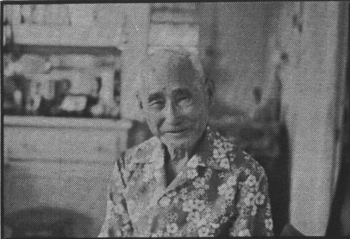Yen Cheung Au

Kalihi: Place of Transition
This project features life history interviews with present and former longtime residents of Kalihi, a multi-ethnic working-class district located west of downtown Honolulu, which has a long history as a home of island immigrants.
Yen Cheung Au, Chinese, the sixth of sixteen children, was born in Waiahole, Oahu on March 7, 1894. His father was a rice farmer in Waiahole. Yen Cheung helped his father in the fields by scaring away the birds which threatened the rice crops. He also helped the family by catching fish and shrimp. He attended Waiahole School until the fourth grade, then the family moved to Kahaluu. In 1915, the family moved to Honolulu and bought a house near Liliha and Judd Streets. Three years later, Yen Cheung was drafted into the U.S. Army and served at Schofield Barracks during World War I. Following his military discharge, he began working as a messenger for American Can Co. in Iwilei. Shortly after, he worked as a meter reader for Hawaiian Electric Co. In 1925, Yen Cheung started working as a machinist at Pearl Harbor Naval Shipyard. Two years later, he and his family bought a home in Kalihi- Kai--the same home he resides in today.
Scope and Content Note
A ninety-year-old retired Pearl Harbor shipyard worker discusses his childhood experiences in Waiahole and his adult experiences in Kalihi.
Program Note:
This interview is part of the Center for Oral History's project Kalihi: Place of Transition. Interviews from this project are available in the Center's ScholarSpace open access repository.
The Center for Oral History (COH), in the Department of Ethnic Studies at the University of Hawaiʻi at Mānoa, collects, documents, preserves and highlights the recollections of Native Hawaiians and the multi-ethnic people of Hawaiʻi. It produces oral histories and interpretive historical materials about lifeways, key historic events, social movements and Hawaiʻi’s role in the globalizing world, for the widest possible use.
Please Note: The oral histories in this collection are protected by copyright and have been created for educational, research and personal use as described by the Fair Use Doctrine in the U.S. Copyright law. Please reach out Voices@noaa.gov to let us know how these interviews are being used in your research, project, exhibit, etc. The Voices staff can help provide other useful resources related to your inquiry.
The NOAA mission is to understand and predict changes in climate, weather, oceans, and coasts, to share that knowledge and information with others, and to conserve and manage coastal and marine ecosystems and resources. The Voices Oral History Archives offers public access to a wide range of accounts, including historical materials that are products of their particular times, and may contain offensive language or negative stereotypes.
Voices Oral History Archives does not verify the accuracy of materials submitted to us. The opinions expressed in the interviews are those of the interviewee only. The interviews here have been made available to the public only after the interviewer has confirmed that they have obtained consent.
